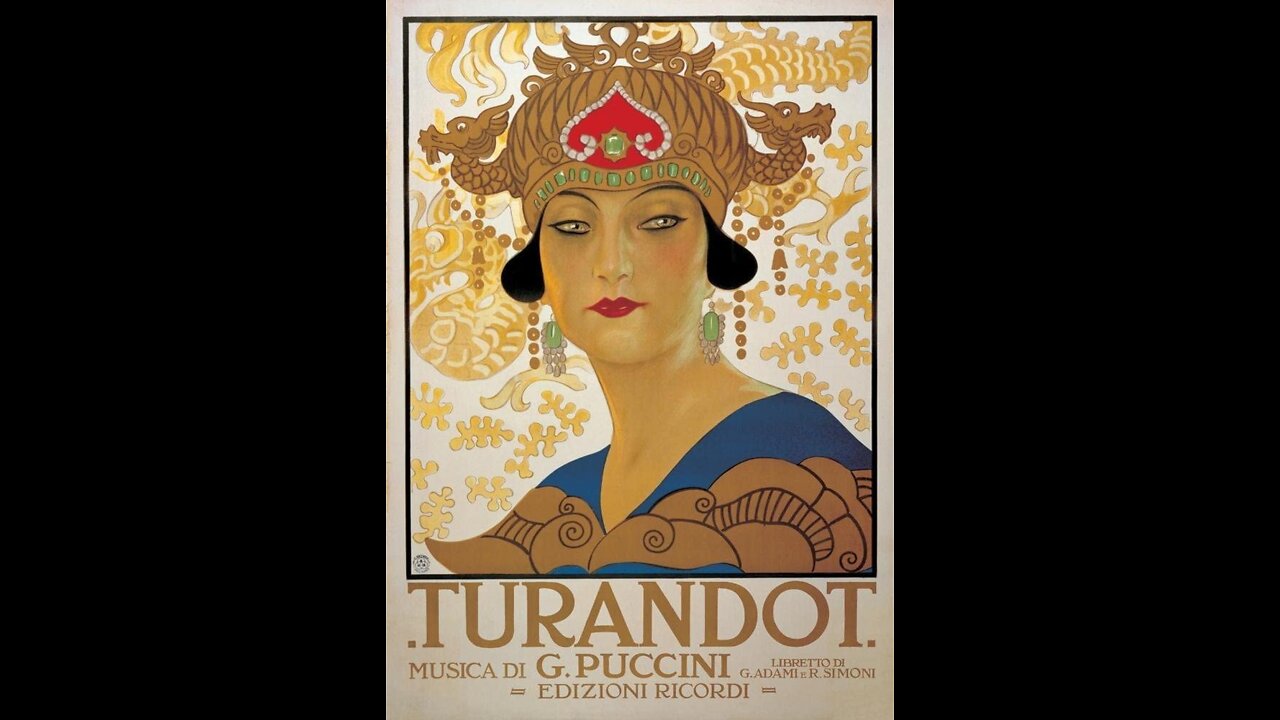Premium Only Content

Turandot
Turandot, last opera by Giacomo Puccini, composed in three acts, with a libretto by Giuseppe Adami and Renato Simoni, based on a play by Carlo Gozzi with an adaptation by Friedrich von Schiller. It premiered at the Teatro alla Scala in Milan on April 25, 1926, under the baton of Arturo Toscanini.
Summary:
Princess Turandot, daughter of Emperor Altum of China, hates all men, and swears that she will never give herself to any of them; this was due to an event in the imperial family that traumatized them forever: the rape and murder of Princess Lo-u-Ling, when the Tatars invaded and conquered China. Her father, however, demands that she marry, for dynastic reasons, and to respect Chinese traditions. The princess agrees; however, on one condition: she will propose three riddles to all candidates, who will risk their own heads if they don't get all three right, and she will only marry the one who deciphers all three very tough riddles. The princess's cruelty and coldness only fan the passion of the Unknown Prince, son of the deposed king of Tartars, who decides to risk his own life to win the proud princess's hand. He succeeds, after the defeat of all the other candidates, not least because he is the only one who shares the princess's sadistic and selfish nature, being able to understand her.
Synopsis:
Act I
Beijing. A herald of the imperial government announces to the crowd, gathered in Tiananmen Square, Emperor Altum's decree: Princess Turandot will marry the one who, of royal blood, deciphers the three riddles she will pose. He who risks, however, and fails, will pay with his life. The Prince of Persia has just tried, but no luck: he will be executed at moonrise. The crowd can't wait to see the performance (Perché tarda la luna?). In the midst of this maddened mob is the old Timur, undiscovered dethroned prince of the Tartars, and his faithful servant Liù. The Unknown Prince, son of Timur, exults with joy when he finds his father, who he thought dead. The moon rises in the sky. The Prince of Persia appears on his way to the scaffold; far from appearing frightened in the face of death, he seems to be in a mystical ecstasy, intoxicated by Turandot's beauty. Here the princess enters the scene for the first time. Taken with pity for the young prince, all beg him for mercy; but, instead, without a single second's hesitation, in an imperious, cold, and cruel gesture, she gives the signal to the executioner who brings the ax down on the prince's neck. It is at this very moment that the Unknown Prince falls in love with Turandot, and announces his intention to apply for the princess' hand. Everyone tries to dissuade him from the idea: his father, the three imperial ministers Ping, Pang and Pong, and Liù, who, in a moving aria, Signore ascolta, confesses that she has been in love with the prince since the day she first saw him smile at the royal palace. The Prince responds by asking him never to stop taking care of his old father if he ever fails (Non piangere Liù). To the general screams of madness! foolish! what are you doing? -the prince takes the hammer, and hits the gong three times, a sign that he is applying for the hand of Turandot.
Act II
The three ministers Ping, Pang and Pong discuss the fate of China, and comment that, since Turandot began to reign, no one has peace in the Celestial Empire: the ax and the instruments of torture work night and day. The scene is set in front of the Imperial Palace for the enigma ceremony. The old Emperor Altum appears, who tries to convince the young suitor to give up: "Allow, my son, that I can die without taking to the grave this guilt for your young life, much blood has already flowed!" But it's all in vain, the stubbornness of the young Unknown Prince leaves everyone dumbfounded. Turandot appears, looking at the candidate with a cold, impassive, and full of disdain. His voice is heard for the first time: "In this palace (Inquesta Reggia), more than a thousand years ago, a desperate cry resounded; and that cry, from the flower of my lineage, an eternal echo in my soul left. Lo-u-Ling!... For centuries she has slept in her huge tomb! Foreigner, give up! The riddles are three, death is one." With the prince turned down his last chance to escape unharmed, Turandot exposes his first riddle. "What is the ghost that is born every night, only to die when the morning comes?" "It's hope," replies the prince. The three sages of the kingdom consult the book of answers: first answer, correct. Turandot, for a brief moment, seems to have felt a shock, but he doesn't let himself be put down, and says with derision: "Yes! The hope that always eludes!" Impassive, she poses the second riddle: "What is red and hot like a flame, but isn't a flame?" "The blood," replies the prince. The sages consult their books: the second answer is also correct. Now, Turandot seems to have lost his composure a little, but convinces himself that all is not lost. Comes the third riddle: "What is the ice that sets you on fire?" "Turandot." "Turandot! Turandot!" cry the wise men in chorus. Right answer! Now, despair takes hold of Turandot, who throws himself into his father's arms: "Father, don't make me give myself to this foreigner!" But her father replies that there is nothing he can do: the oath is sacred. The Unknown Prince, however, states that he does not want to have Turandot against the princess's wishes. He proposes, then, a single riddle; if she answers correctly, he gives up her rights, and hands over his head to the executioner. "You have until dawn," says he, "to discover my name."
Act III
Civil servants roam the streets of Beijing with lanterns lit. In a perfect dictatorship, where she has unlimited powers, Turandot has ordered that no one sleeps tonight in Beijing: everyone must help discover the name of the Unknown Prince. It is then that the prince sings the famous aria Nessun dorma (Let no one sleep). The three ministers Ping, Pang and Pong try to do everything to convince the young man to give up, offering him beautiful women, riches, and an exit visa from China - but all in vain. Suddenly, someone remembers seeing the young prince with Liù and the old man. Turandot orders Liù to be tortured until she reveals the prince's name; she dies without a word, in one of the most moving deaths of all operas. The day dawns with the old man crying over Liù's corpse. "Liù, kindness! Liù, sweetness! Liù, poetry!". Calaf, the unknown prince sees Turandot, she asks everyone to leave and has a duo with him (this one already composed by Franco Alfano) in which she reveals herself to be humble. Calaf tells her her name, and the guards arrive; Turandot restores her pride, but when talking about Calaf's name she says his name is "Love".
-
 1:01:17
1:01:17
The StoneZONE with Roger Stone
10 hours agoChristmas Edition: Why the Panama Canal is Part of the America First Agenda | The StoneZONE
77K24 -
 LIVE
LIVE
LFA TV
21 hours agoLFA TV CHRISTMAS EVE REPLAY
1,758 watching -
 4:33:48
4:33:48
tacetmort3m
1 day ago🔴 LIVE - THE ZONE KEEPS PULLING ME BACK - STALKER 2 - PART 15
54.4K12 -
 22:45
22:45
Brewzle
17 hours agoI Went Drinking In A Real Bourbon Castle
37.7K3 -
 48:36
48:36
PMG
1 day ago $2.69 earned"Parkland Parent Speaks Out On Kamala Harris Using Victims"
30.1K4 -
 4:06
4:06
The Lou Holtz Show
16 hours agoCoach Lou Holtz’s Heartfelt Christmas Message 🎄 | Family, Faith & Notre Dame Spirit 💚 #christmas
22.3K -
![ROSEANNE BARR - Her Journey, TRUMP, and the MAGA GOLDEN AGE! [INTERVIEW]](https://1a-1791.com/video/s8/1/M/m/B/2/MmB2v.0kob.1-small-ROSEANNE-BARR-Her-Journey-T.jpg) 51:35
51:35
Dr Steve Turley
1 day ago $19.18 earnedROSEANNE BARR - Her Journey, TRUMP, and the MAGA GOLDEN AGE! [INTERVIEW]
57.2K54 -
 57:38
57:38
The Tom Renz Show
14 hours agoMerry Christmas - The Tom Renz Show Christmas
93.4K17 -
 2:59:10
2:59:10
Wendy Bell Radio
1 day agoThe Bridge Too Far
171K301 -
 1:03:45
1:03:45
Donald Trump Jr.
1 day agoHappy Festivus: Airing Our Grievances and Stopping The Swamp w/Sean Davis | TRIGGERED Ep.201
430K549